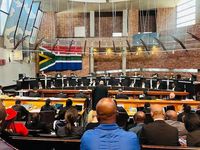The Constitutional Court of South Africa has made a landmark decision, affirming a ruling by the Supreme Court that declares certain sections of the Citizenship Act unconstitutional and invalid. This ruling, made on May 6, 2025, specifically targets Section 6(1) of the Citizenship Act, which stated that South Africans would automatically lose their citizenship if they voluntarily acquired citizenship in another country.
The court's decision has significant implications for nearly 2 million South Africans living abroad, many of whom may have unknowingly lost their citizenship. The Democratic Alliance (DA), which initiated the legal challenge a decade ago, argued that the provisions of the Act stripped citizenship without proper notice or justification, violating constitutional rights.
According to the DA, the original provisions allowed for the automatic loss of citizenship under circumstances that lacked transparency and fairness. The first legal challenge was dismissed by the High Court, which held that the Act served a legitimate government purpose. However, the DA was granted leave to appeal, and in June 2023, the Supreme Court of Appeal sided with the party, ruling that the section was irrational and inconsistent with the Constitution.
In its unanimous decision, the Constitutional Court stated that losing citizenship under the Act had severe consequences, effectively deeming individuals as foreigners. Justice Steven Majiedt, who delivered the ruling, emphasized that there is no legitimate government purpose in automatically stripping someone of their citizenship under the circumstances outlined in the Act. He noted that the rationale for maintaining such a law was left unexplained.
The court found that the provisions in question did not provide any criteria for how the Minister of Home Affairs could exercise discretion in allowing individuals to retain their citizenship. Justice Majiedt remarked, “The legislature argued that dual citizenship is permissible, subject only to ministerial discretion. This reasoning is unclear and utterly irrational.” He further stated, “There is no conceivable purpose nor rational connection why a South African should automatically lose their citizenship by acquiring the citizenship of another country, particularly with the increasing cross-border migration of people.”
The DA celebrated the ruling as a major victory for South Africans, especially for those living abroad who had their citizenship stripped without prior knowledge. “So many South African citizens had the rug pulled out from under them when they suddenly discovered they had lost their citizenship, without warning,” the party stated. “It is equally important for those living in South Africa who have acquired a second nationality.”
The Constitutional Court's ruling not only invalidates the specific section of the Citizenship Act but also reinstates citizenship for all individuals affected by this provision since its enactment in 1995. This means that those who lost their citizenship due to the law are now deemed to have never lost it.
The case was brought to the Constitutional Court after the DA's previous legal battles, which included a loss in the Pretoria High Court. The High Court had ruled that the section was not irrational and did not infringe upon constitutional rights. However, the Supreme Court of Appeal later reversed this decision, stating that the law arbitrarily treated South Africans with dual citizenship differently from those who intended to acquire citizenship in another country.
Justice Majiedt highlighted the severe consequences of the automatic loss of citizenship, stating, “Loss of citizenship has severe consequences. It entails being deemed to be a foreigner. Where the law automatically terminates citizenship without any forewarning and even knowledge, simply on account of dual citizenship, that is plainly a deprivation of citizenship.”
The ruling is a culmination of a decade-long legal battle that has drawn attention to the rights of South Africans living abroad. The DA's spokesperson, Willie Aucamp, noted, “This is a testament to the mandate South African voters have given the DA to fight for their rights and to uphold the Constitution.” He also criticized former Ministers of Home Affairs for resisting the party's legal efforts.
As a result of this ruling, the Department of Home Affairs is now obligated to restore citizenship to those who were stripped of it under the unconstitutional provisions. The DA has committed to ensuring that the rights of these citizens are fully realized and that the Department takes the necessary steps to rectify past injustices.
This decision is expected to have a profound impact on many South Africans who have been living in uncertainty regarding their citizenship status. The court’s ruling not only restores citizenship but also reinforces the importance of constitutional rights and the need for fair legal processes in matters of citizenship.
The Constitutional Court's decision has been hailed as a significant step towards protecting the rights of individuals and ensuring that citizenship is not stripped arbitrarily. As South Africa continues to navigate the complexities of citizenship and nationality in an increasingly globalized world, this ruling sets a precedent for the treatment of citizens and their rights.





